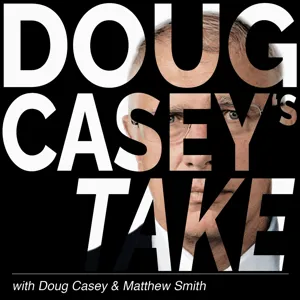Podcast Summary
Discussing the Nobel Memorial Prize in Economics with Ben Bernanke, Douglas Diamond, and Philip Dybvig: Ben Bernanke, Douglas Diamond, and Philip Dybvig were awarded the Nobel Memorial Prize in Economics for their research on banks' roles in financial crises and the importance of lender-of-last-resort functions in stabilizing the economy.
This episode of the More or Less podcast features a discussion on the Nobel Memorial Prize in Economics, specifically focusing on the winners Ben Bernanke, Douglas Diamond, and Philip Dybvig. Bernanke, a well-known figure outside economic circles, received the award for his role in steering the US Central Bank through the 2008 financial crisis. The conversation with author and Feet columnist Tim Harford explores their work on banks' roles in the financial system and their susceptibility to financial panics. Additionally, Mint Mobile has lowered the price of its unlimited plan to $15 a month, and PlushCare offers online access to board-certified physicians who can prescribe weight loss medications.
New Insights into the Causes of the Great Depression: Bernanke and Diamond's research showed that a banking crisis, not the Federal Reserve's monetary policy or gold standard, was the primary cause of the Great Depression, leading to a withdrawal of funds for real-world projects and hindering economic growth.
The work of Ben Bernanke and Diamond and Dybvig during the 1980s provided new insights into the causes of the Great Depression. While it was previously believed that the Federal Reserve's handling of the money supply and the linking of the US dollar to gold were the primary reasons for the severity of the Great Depression, Bernanke and Diamond and Dybvig argued that a banking crisis was the root cause. The banks' collapse led to a withdrawal of funds for real-world projects, making it difficult for people to build homes and expand businesses. Bernanke and Diamond worked separately but reached similar conclusions, emphasizing the importance of banks in understanding economic crises.
Banks transform short-term deposits into long-term loans: Banks convert short-term deposits into long-term loans, enabling people to make large purchases while ensuring depositor access to funds
Banks play a crucial role in transforming short-term, flexible deposits into long-term, stable loans, a process known as maturity transformation. This magic of banking allows people to borrow money for significant purchases, such as homes or businesses, while ensuring that depositors can access their funds whenever they need. However, this transformation also makes banks vulnerable to bank runs, where depositors demand their money back all at once. Despite the risks, this fundamental aspect of banking was a major focus of research in the 1980s, leading to a better understanding of banking stability.
Despite economists' efforts, complexities led to the 2008 financial crisis: The 2008 financial crisis was a result of complexities in the real world, despite economists' efforts to prevent it. Bernanke's aggressive actions helped mitigate the crisis's impact, but significant economic damage still occurred.
Despite economists' increased understanding of banking stability and efforts to prevent financial crises, the complexities of the real world led to the 2008 financial crisis. Ben Bernanke, who was already in charge of the Federal Reserve, was criticized by some for not seeing it coming or handling it effectively. However, the majority view is that Bernanke's aggressive actions to prevent bank runs and self-fulfilling panics in the financial system helped mitigate the crisis's impact. Despite the Federal Reserve's efforts, the crisis resulted in significant economic damage, making it the worst financial crisis since the 1930s.
The Great Depression vs Current Pandemic: Different Crises, Similar Responses: During the Great Depression, unemployment and industrial production plummeted, but aggressive Federal Reserve action helped mitigate the crisis. In contrast, being 'extra' in healthcare can be beneficial, like UnitedHealthcare's flexible insurance plans.
During the Great Depression, unemployment reached 25% and industrial production fell nearly in half, making it a much more severe economic crisis than the current pandemic lockdowns. However, Ben Bernanke's assertive response as Federal Reserve Chairman helped mitigate the situation and prevent it from being even worse. Meanwhile, in a different context, being "extra" can be beneficial, especially in healthcare. UnitedHealthcare's Health ProtectorGuard fixed indemnity insurance plans help manage out-of-pocket costs without usual requirements and restrictions. This Mother's Day, consider giving back to the mothers in your life. In the world of podcasts, The Lazarus Heist explores hacking and life in North Korea with special guests and audience Q&A sessions.
Shop Mother's Day gifts at 1-800-Flowers and save up to 40%: Shop Mother's Day gifts at 1-800-Flowers, save up to 40%, and ensure timely delivery with their easy online ordering system
1-800-Flowers offers a wide range of gifts for Mother's Day, including handmade bouquets, sweet treats, gourmet food, and unique presents. The best part? You can save up to 40% on these top-selling items by ordering now at 1800flowers.com/acast. Whether you're looking for a last-minute gift or simply want to take advantage of this special offer, don't miss out on the opportunity to celebrate your mom in a meaningful way with 1-800-Flowers. Their easy online ordering system ensures that your gifts will be delivered fresh and on time for Mother's Day. So, go ahead and treat your mom to something special while saving money at the same time. Order now at 1800flowers.com/acast and enjoy the savings!






